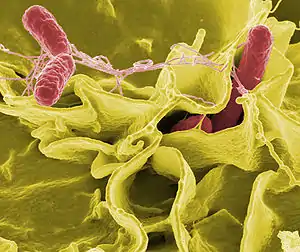Dipshikha Chakravortty
Dipshikha Chakravortty is an Indian microbiologist, molecular pathologist and a professor at the department of Microbiology and Cell Biology at the Indian Institute of Science. Known for her studies on Salmonella and antibacterial resistance, Chakravortty is an elected fellow of the National Academy of Sciences, India, the Indian Academy of Sciences and the Indian National Science Academy. The Department of Biotechnology of the Government of India awarded her the National Bioscience Award for Career Development, one of the highest Indian science awards, for her contributions to biosciences, in 2010.[1]
Dipshikha Chakravortty | |
|---|---|
| Born | Jabalpur, Madhya Pradesh, India |
| Nationality | Indian |
| Alma mater | |
| Known for | Studies on Salmonella, antibacterial resistance |
| Awards |
|
| Scientific career | |
| Fields | |
| Institutions | |
| Doctoral advisor |
|
Biography

Dipshikha Chakravortty was born in 1968[2] at Jabalpur, in the second largest Indian state of Madhya Pradesh to Santosh Kumar Chakravortty and Bani Chakravortty.[3] Her early schooling was in Mumbai where the family had moved soon after her birth. After earning a bachelor's degree in microbiology from LAD College for Women of Rashtrasant Tukadoji Maharaj Nagpur University, and a master's degree in microbiology from the University of Nagpur. She did her doctoral studies, assisted by junior and senior research fellowships, under the guidance of K. S. Nandakumar at the National Centre for Cell Science which secured her a PhD from Savitribai Phule Pune University.[4] Thereafter, she moved to Japan for her post-doctoral studies and completed it under the supervision of Takashi Yokochi of Aichi Medical University. Subsequently, she took up a research position at the laboratory of Michael Hensel in Erlangen, Germany and worked there on an Alexander von Humboldt fellowship. On her return to India in 2004, she joined the Department of Microbiology and Cell Biology of the Indian Institute of Science (IISc) as a faculty,[5] where she holds the position of a professor.[4] At IISc, she has established her laboratory, Molecular Pathogenesis Lab[6] and hosts a number of researchers and scholars.[7]
Chakravortty resides at IISc Campus, in Bengaluru, Karnataka.[2]
Professional profile
Chakravortty's research focus is on antibacterial resistance with special emphasis on Salmonella[5] and she is known to have done work on the pathogenesis of Salmonella typhimurium, a gram negative bacterium pathogen.[8] Her laboratory works on diseases such as Typhoid, and the host-pathogen interaction with regard to the disease, with a view to develop a vaccine with a long-time memory against the pathogen.[6] The team led by her has been successful in developing a treatment protocol for sepsis which uses a Bactericidal/permeability-increasing protein, a type of glycoprotein, which has been found to neutralize the bacterial endotoxin, one of the primary causative factors of sepsis.[9] Her studies have been documented by way of a number of articles[10][note 1] and ResearchGate, an online repository of scientific articles has listed 169 of them.[11] Besides, she has contributed chapters to books edited by others.[12] She has also mentored many research scholars in their doctoral studies.[7][13]
Awards and honors
The Department of Biotechnology (DBT) of the Government of India awarded her the National Bioscience Award for Career Development, one of the highest Indian science awards in 2010.[1] The National Academy of Sciences, India elected her as a fellow in 2012[14] and she became an elected fellow of the Indian National Science Academy in 2017.[15] The Indian Academy of Sciences elected her as a fellow in 2021.[16] She is also a recipient of Prof S. K. Chatterjee award of the Indian Institute of Science (2021),[17] NASI-Reliance Platinum Jubilee Award (2015),[18] DAE SRC Outstanding Investigator Award (2015),[19] Alexander von Humboldt fellowship[20] and was a member of the IISc Team that won gold medal at iGEM 2017 and iGEM 2018 contest, held in Boston.[21]
Selected bibliography
Chapters
- Riccardo Bonazza; Devesh Ranjan (10 July 2015). 29th International Symposium on Shock Waves 2. Springer. pp. 877–. ISBN 978-3-319-16838-8.
Articles
Bhosle A, Datey A, Chandrasekharan G, Singh D, Chakravortty D, Chandra N.A, 2020, Strategic Target Rescues Trimethoprim Sensitivity in Escherichia coli. iScience. 2020 Mar 16;23(4):100986. doi: 10.1016/j.isci.2020.100986. [Epub ahead of print
Datey A, Thaha CSA, Patil SR, Gopalan J, Chakravortty D.,2019, Shockwave Therapy Efficiently Cures Multispecies Chronic Periodontitis in a Humanized Rat Model. Front Bioeng Biotechnol. 2019 Dec 13;7:382. doi: 10.3389/fbioe.2019.00382. eCollection
Nagarajan D, Roy N, Kulkarni O, Datey A, Ravichandran S, Thakur C, Sandeep T, Aprameya IV, Sarma SP, Chakravortty D*, Chandra N*, 2019, Omega76: A designed antimicrobial peptide to 1 combat carbapenem and tigecycline resistant ESKAPE pathogens Science Advances,5(7):eaax1946.
Balakrishnan A, Chakravortty D, 2017, Bactericidal/permeability increasing- Epithelial cell damage activates protein expression in epithelial cells, Frontier in Microbiology, 2017 Aug 15;8:1567. doi: 10.3389/fmicb.2017.01567.
Datey A, Janardhan Gm Gopalan J, Chakravortty D,2017, Mechanism of transformation in Mycobacteria using a novel shockwave assisted technique driven by in situ generated oxyhydrogen, Sci Rep, 2017 Aug 17;7(1):8645. doi: 10.1038/s41598-017-08542-5.
Balakrishnan A, DasSarma P, Bhattacharjee O, Kim JM, DasSarma S, Chakravortty D. 2017, Halobacterial nano vesicles displaying murine bactericidal permeability-increasing protein rescue mice from lethal endotoxic shock., Sci Rep. Sep 20;6:33679.
Balakrishnan A, Schnare M, Chakravortty D. 2016 Of men not mice: Bactericidal/permeability-increasing protein (BPI) expressed in human macrophages acts as a phagocytic receptor and modulates entry and replication of Gram-negative bacteria., Frontiers in Immunol. 7,455.
Das P, Lahiri A, Chakravortty D,2010, Modulation of the arginase pathway in the context of microbial pathogenesis: a metabolic enzyme moonlighting as an immune modulator. PLoS Pathog, 6, e1000899.
See also
Notes
- Please see Selected bibliography section
References
- "Awardees of National Bioscience Awards for Career Development" (PDF). Department of Biotechnology. 2016. Retrieved 20 November 2017.
- "NASI fellows". National Academy of Sciences, India. 25 January 2018. Retrieved 25 January 2018.
- Chakravortty D (25 January 2018). "Virulence profile". Virulence. 5 (2): 321–5. doi:10.4161/viru.27047. PMC 3956508. PMID 24504093.
- "Department of Microbiology and Cell Biology". DMCB - IISc. 25 January 2018. Retrieved 25 January 2018.
- "Faculty profile". Indian Institute of Science. 25 January 2018. Retrieved 25 January 2018.
- "Molecular Pathogenesis Lab". Indian Institute of Science. 25 January 2018. Retrieved 25 January 2018.
- "Molecular Pathogenesis Lab - People". Indian Institute of Science. 25 January 2018. Retrieved 25 January 2018.
- "Research Interests". Indian Institute of Science. 25 January 2018. Retrieved 25 January 2018.
- "IISc scientists design cost-effective treatment for sepsis". Research Matters. 5 December 2016. Retrieved 25 January 2018.
- "On Google Scholar". Google Scholar. 20 January 2018. Retrieved 20 January 2018.
- "On ResearchGate". 20 January 2018. Retrieved 20 January 2018.
- Riccardo Bonazza; Devesh Ranjan (10 July 2015). 29th International Symposium on Shock Waves 2. Springer. pp. 877–. ISBN 978-3-319-16838-8.
- "Wellcome DBT - View Main - Profile". wellcomedbt.org. 25 January 2018. Retrieved 25 January 2018.
- "NASI Year Book 2015" (PDF). National Academy of Sciences, India. 25 January 2018. Retrieved 25 January 2018.
- "Indian fellow". Indian National Science Academy. 25 January 2018. Retrieved 25 January 2018.
- "Indian Institute of Science fellows 2021". Retrieved 1 February 2021.
- "Indian Institute of Science Prof S. K. Chatterjee award". Retrieved 1 February 2021.
- "Part 4 - IISc" (PDF). Indian Institute of Science. Retrieved 1 February 2021.
- "Europe PMC". europepmc.org. Retrieved 1 February 2021.
- "Women in Science – Prof. Dipshikha Chakravortty". Retrieved 1 February 2021.
- "iGEM 2017 Team Information". igem.org. Retrieved 1 February 2021.
External links
- Chakravortty D (2014). "Smart Evasion Strategies by Salmonella". Virulence. 5: 321–5. doi:10.4161/viru.27047. PMC 3956508. PMID 24504093.
